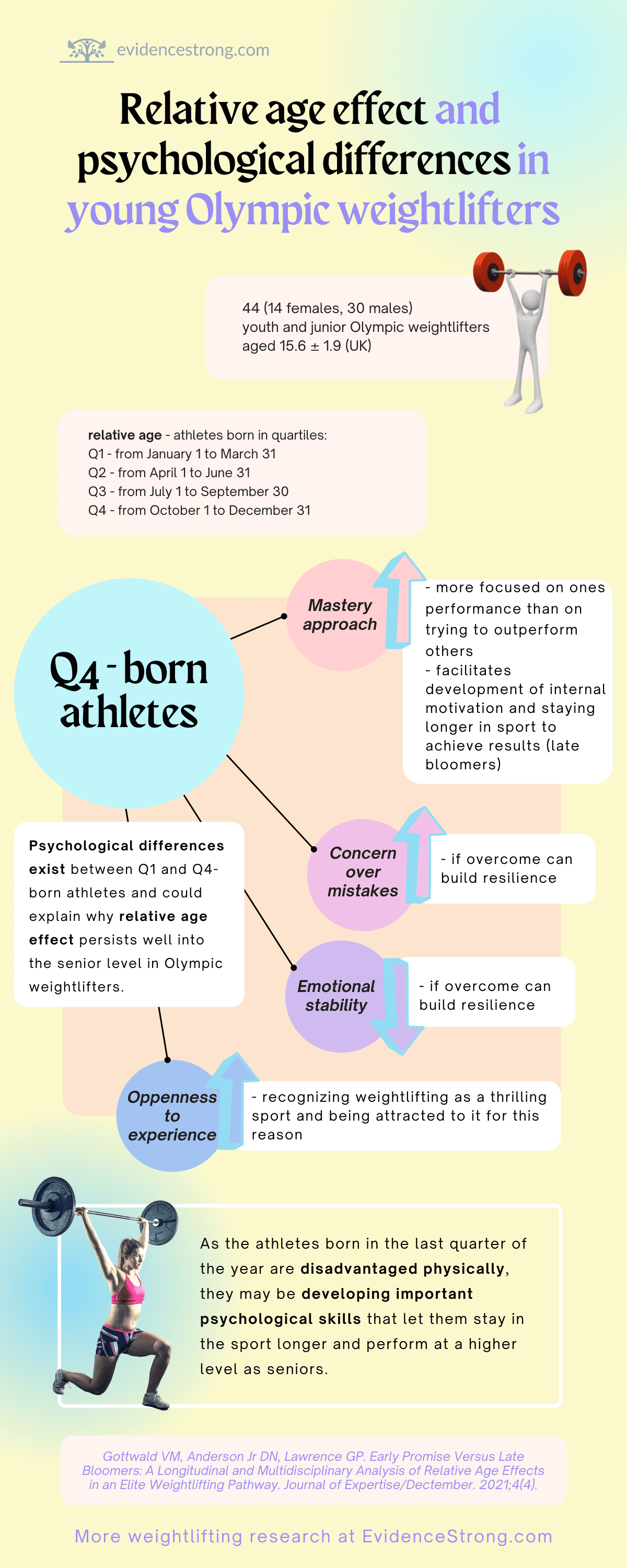Summary of a study investigating the psychological differences between young Olympic weightlifters born at the beginning or at the end of the year.
Who
44 (14 females, 30 males) youth and junior weightlifting athletes aged 15.6 ±1.9 (UK):
- lightweight (14 athletes)
- middleweight (22 athletes)
- heavyweight (5 athletes)
Design
A battery of questionnaires.
Outcome measures/tests
- date of birth, relative age (born in quartiles: Q1, Q2, Q3, Q4: athletes born between January 1 and March 31 were assigned as quartile 1 (Q1), April 1 to June 31 as quartile 2 (Q2), July 1 to September 30 as quartile 3 (Q3), and October 1 to December 31 as quartile 4 (Q4)); born in the first half of the way (H1) and born in the second half of the
- psychometric battery of 110 items:
- 2x2 achievement goal questionnaire for sport (AGQ-S)
- an early iteration of an athlete psychological survey
- the importance of others in the self
- the ten-item personality inventory
- the sport multidimensional perfectionism scale-2
- the passion scale
- adopted version of the Yale-brown obsessive-compulsive scale
Main results
- 19 weightlifters (5 females, 14 males) were born in the first half of the year, and 25 (9 females, 16 males) were born in the second half of the year.
- Out of 26 constructs, 4 were selected to possibly predict the relative age effect:
- mastery approach - becoming the best version of oneself, becoming better than their last performance (potentially increases intrinsic motivation and absorption in the task, leading to staying in the sport for longer)
- concern over mistakes - reacting negatively to one’s performance, being concerned over mistakes, which may lead to anxiety
- emotional stability - staying balanced in a variety of situations
- openness to experience - seeking varied experiences
- The model used in the analysis to predict differences between athletes born in the first and second half of the year was weak, but could predict differences between Q1 and Q4 with 76% accuracy:
- Q4 athletes tend to report a higher mastery approach which may lead to being more focused on aspects of their own performance (that require improvement), as opposed to trying to outperform others as they may have been biologically or psychologically disadvantaged (as being younger). This approach may facilitate staying longer in sport and achieving results (medals) later in the career (late bloomers).
- Q4 athletes reported higher concern over mistakes than Q1 athletes. Overcoming this later in the career could result in building more resilience.
- Q4 athletes described themselves less as “…calm, emotionally stable” than Q1 athletes.
- Q4 athletes reported higher openness (experience seeking), which could have contributed to recognizing weightlifting as a thrilling sport and being attracted to it for this reason.
Take home message
For a clinician & coach
The relative age effect is present in weightlifting and persists well into the senior level. Four psychological aspects may predict relative age effect with 76% accuracy. These are mastery approach, concern over mistakes, emotional stability, and openness to experience. As the athletes born in the last quarter of the year are disadvantaged physically, they may be developing important psychological skills that let them stay in the sport longer and perform at a higher level as seniors.
For a parent
As the athletes born in the last quarter of the year are disadvantaged physically, they may be developing important psychological skills that let them stay in the sport longer and perform at a higher level as seniors.
For an athlete
As the athletes born in the last quarter of the year are disadvantaged physically, they may be developing important psychological skills that let them stay in the sport longer and perform at a higher level as seniors.
Original article
Gottwald VM, Anderson Jr DN, Lawrence GP. Early Promise Versus Late Bloomers: A Longitudinal and Multidisciplinary Analysis of Relative Age Effects in an Elite Weightlifting Pathway. Journal of Expertise/Dectember. 2021;4(4).
You might want to read next
How the month you were born in affects your Olympic weightlifting performance?
What happens during 10 years of Olympic weightlifting? (in women)
How oral contraceptives influence strength performance and health
